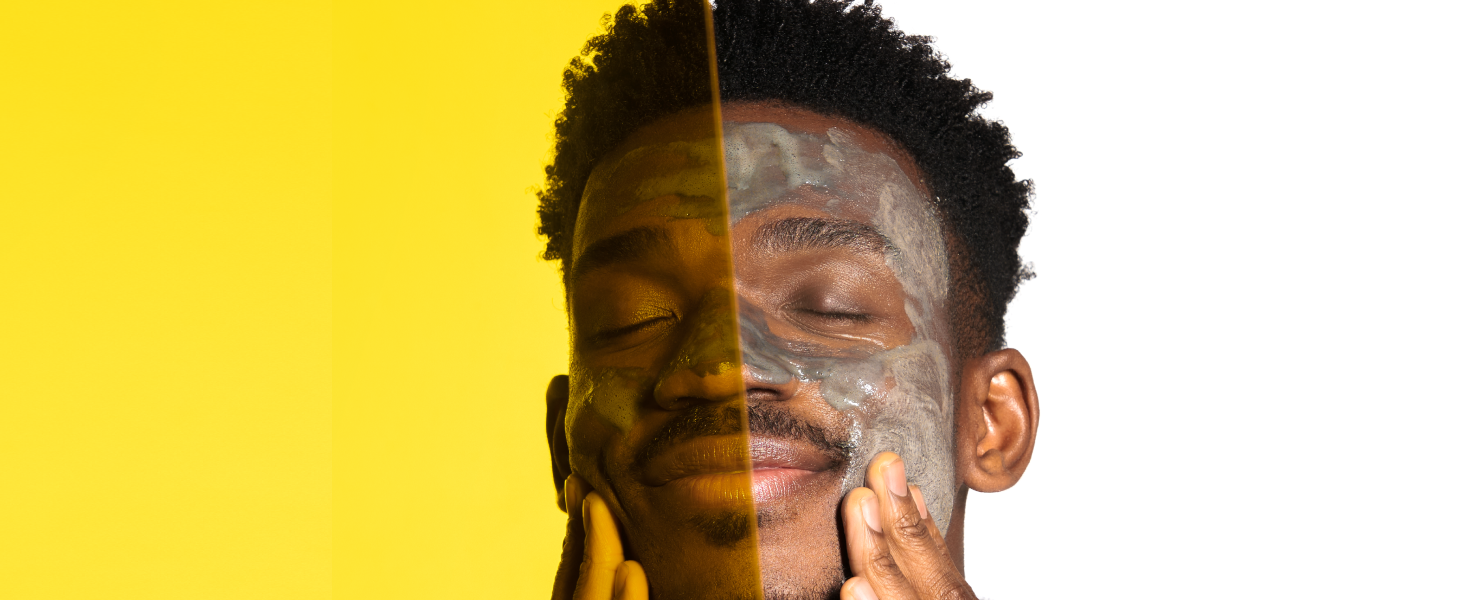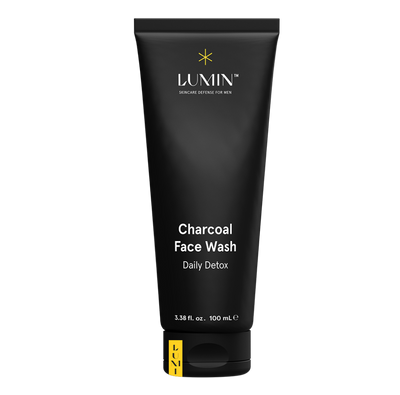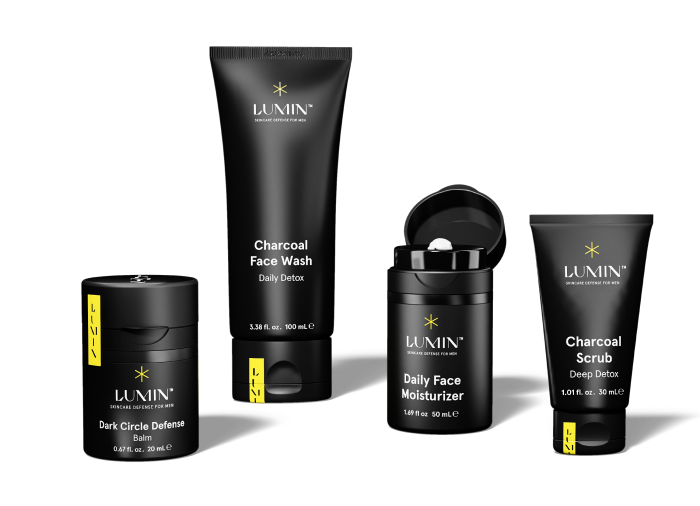A Guide to Preventing and Treating Acne for Men - Lumin

Men in their 20s and 30s can still experience breakouts and pimples. Discover what causes acne and the steps you can take to help treat and prevent it.
7 MINUTE READ


Men in their 20s and 30s can still experience breakouts and pimples. Discover what causes acne and the steps you can take to help treat and prevent it.
7 MINUTE READ

Clearing Up Confusion: A Guide to Preventing and Treating Breakouts for Men in their 20s and 30s
TL;DR: Acne is caused when hair follicles become clogged with dead skin cells, oil and bacteria. Treating and preventing acne requires a consistent skincare routine that includes the use of products specifically designed for breakout-prone skin, as well as paying attention to other factors such as proper nutrition, sleep, stress management and changing pillow cases regularly.
Acne is often only thought of as something that teenagers deal with, but men of all ages can still experience breakouts and pimples well into adulthood. While there are many over-the-counter products available to treat and prevent acne, it's important to take a holistic approach to skincare in order to achieve the best results.
A Brief History of Acne & Breakouts
Acne is a common skin condition that affects millions of people worldwide. It is characterized by the appearance of pimples, blackheads, whiteheads, and other blemishes on the skin. While acne is often associated with adolescence, it can affect people of all ages, and its causes and treatments have been the subject of study for centuries.
The history of acne dates back to ancient times, when people believed that acne was caused by impure blood or bad hygiene. In ancient Egypt, for example, people would use a mixture of honey and milk to treat acne, while in ancient Greece, they believed that acne was caused by an excess of blood and recommended bloodletting to treat it. Thankfully, we know now that bloodletting is definitely NOT helpful for treating acne.
Throughout the centuries, many different treatments for acne were developed, ranging from the use of sulfur and mercury to the application of snake oil and other dubious remedies. However, it wasn't until the 19th century that acne began to be studied scientifically, and the first breakthroughs in understanding its causes were made.
In the early 20th century, scientists began to study the role of hormones in acne, and it was discovered that androgen, a type of hormone, played a key role in the development of acne. This discovery led to the development of treatments such as birth control pills and anti-androgen medications, which are still used today to treat acne.
What Causes Acne
However, it wasn't until the 1960s that the root cause of acne was fully understood. It was discovered that acne is caused by the blockage of hair follicles with a combination of oil, dead skin cells, and bacteria. This discovery led to the development of treatments that target these underlying causes, such as topical and oral antibiotics, retinoids, and other medications.
Today, we know that acne is a complex condition with many contributing factors. In addition to hormonal imbalances and the blockage of hair follicles, other factors that can contribute to acne include stress, diet, genetics, and environmental factors such as pollution and exposure to certain chemicals.
While we have come a long way in understanding the causes of acne, there is still much that we don't know. For example, researchers are still working to understand why some people are more prone to acne than others, and why some treatments work better for some people than for others.
When it comes to skincare, preventing and treating acne is an important concern for many people. However, it's important to remember that each person’s skin is unique, and what works for one person may not work for another. Additionally, it's important to be patient when treating acne, as it can take time to see results.
Let’s take a look at some ways you can treat and prevent acne.
Good Nutrition Leads to Good Skin
In addition to using the right products, it's important to pay attention to other factors that can contribute to acne, such as proper nutrition, sleep, and stress management. Some studies suggest that dairy products, sugar and refined carbohydrates found in white bread and pasta can play a role in causing breakouts, so it might be wise to moderate consumption of those foods.
While there is no one-size-fits-all diet for acne, there are some general guidelines that can be helpful for promoting healthy skin.
First and foremost, it's important to eat a balanced diet that includes plenty of fruits, vegetables, whole grains, lean protein, and healthy fats. This can help ensure that you're getting all the nutrients your body needs to support healthy skin and overall health.
In particular, foods that are high in antioxidants, such as berries, leafy greens, and nuts, can be especially beneficial for preventing acne. Antioxidants help protect the skin from damage caused by free radicals, which can contribute to inflammation and other skin problems.
It's also important to limit your intake of foods that are known to trigger acne or worsen existing breakouts. These include foods that are high in sugar, such as soda, candy, and other sweets, as well as foods that are high in refined carbohydrates, such as white bread and pasta. Additionally, some people may find that dairy products or foods that are high in iodine, such as seaweed and shellfish, can trigger acne.
Overall, a healthy diet for preventing acne should focus on whole, nutrient-dense foods while limiting intake of processed and high-sugar foods. We hate to be the ones to tell you to eat your spinach, but we’re just the messenger here.
Stay Hydrated
Staying hydrated is essential for maintaining healthy skin and preventing acne. When you're dehydrated, your body produces more oil to compensate for the lack of moisture, which can lead to clogged pores and acne breakouts.
In addition to keeping your skin hydrated, drinking plenty of water can also help flush toxins from your body, which can contribute to inflammation and other skin problems. Water can also help improve blood flow and oxygenation to the skin, which can promote healthy cell growth and repair.
It's important to note that while staying hydrated is important for preventing acne, it's not a cure-all. Other factors, such as hormones, genetics, and environmental factors, can also contribute to acne. However, by drinking plenty of water and staying hydrated, you can help support healthy skin and reduce your risk of developing acne. Aim to drink at least 8 glasses of water per day, and more if you're particularly active or live in a hot, dry climate.
Get Your ZZZs and Don’t Forget to Chill Out
Getting enough sleep is also critical for maintaining overall health, including the health of your skin. In one study, researchers identified a relationship between the quality of someone’s sleep and acne. Study participants who reported poorer sleep were more likely to develop acne breakouts, they found.
Of course, stress can cause poor sleep, and stress by itself can play a role in making acne breakouts worse. While you can’t always change external factors that are causing you stress, you can work on how you manage stress. Practicing mindfulness, exercising regularly, going to therapy, engaging in a hobby and so on can all go a long way to help keep you feeling balanced and in control.
One Practical Tip: Change Your Pillowcase
On the topic of sleep, one easy way to prevent breakouts is to change your pillowcases regularly, as oils and bacteria from your skin can accumulate on the fabric, leading to breakouts. If you haven’t washed your pillowcase in weeks, you’re essentially resting your face on all of those accumulated oils and bacteria. Kinda gross the more you think about it, huh? You know what - stop reading this article right now and just go change your pillowcase.
How Lumin Can Help
One of the most effective ways to target breakouts is through a consistent skincare routine that includes the use of products specifically designed for breakout-prone skin. Here at Lumin, we offer several products that can be used as part of an effective core skincare routine, including the Charcoal Face Wash, Charcoal Scrub and Daily Face Moisturizer.
The Charcoal Face Wash is a deep-cleansing formula that removes dirt and impurities from the skin, while the Charcoal Scrub gently removes dead skin cells that can clog pores and lead to acne breakouts. The Daily Face Moisturizer helps to balance the skin's natural oils and leaves it feeling hydrated and refreshed. For information on the ingredients we use in our men's skincare products, be sure to check out our skincare ingredients article.
The Charcoal Face Wash is formulated with activated charcoal, which helps draw out impurities from the skin and unclog pores. This can be especially beneficial for targeting breakouts, as clogged pores can trap oil, dead skin cells, and bacteria. Additionally, the Charcoal Face Wash contains Centella Asiatica, which contains active compounds that help repair skin.
The Charcoal Scrub was formulated with active charcoal and designed to deep clean skin and remove all the gunk from your pores, which can be important for preventing breakouts. It’s formulated with natural cotton cellulose, to gently remove dead skin cells and smooth texture. Additionally, the Charcoal Scrub contains Lactic Acid, to help unclog pores while helping calm irritation.
Finally, the Daily Face Moisturizer is formulated with a blend of natural oils and extracts, such as ginger extract and meadowfoam seed oil, that help replenish the skin's moisture barrier and promote healthy, balanced skin. When the skin is dry or dehydrated, it can produce more oil to compensate, leading to clogged pores and breakouts..
Adding our Charcoal Face Wash, Charcoal Scrub, and Daily Face Moisturizer to your skincare routine is a great way to help prevent breakouts.
In Conclusion
One more note: While Lumin products are designed to be part of a holistic skincare routine that can help prevent breakouts, more severe cases may require the guidance of a dermatologist. If you're struggling with persistent acne, it's best to consult with a dermatologist to determine the best course of treatment for you.

There’s nothing like that ‘aaahh’ feeling when you’ve splashed cool water over a fresh, clean face. Our Charcoal Face Wash Daily Detox is made specifically for men’s skin, working to remove grime while keeping your skin’s pH balanced. Go ahead and say it, aaahhhh.

